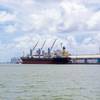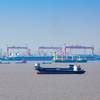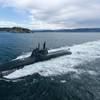Maritime Strategy Port Call at University of Denver
By Mass Communication Specialist 1st Class Leif HerrGesell, Navy News Service
The diplomats of tomorrow met with Deputy Chief of Naval Operations Vice Adm. John Morgan and naval strategist Capt. Dan Cloyd at the , March 26 to discuss the new joint-service Maritime Strategy and what it means to the nation's future.
Over 50 students and faculty from the university's Graduate School of International Studies (GSIS) gathered in an intimate forum to listen to Morgan as he described the way ahead for national and global security, shared Sea Service responsibility for peace and prosperity and layered defense of the American homeland.
He also outlined goals for the prevention of war and planning for humanitarian relief as priorities of today's Navy, Marine Corps and Coast Guard.
Morgan is the deputy chief of naval operations for information, plans and strategy. The admiral's office is supported by the efforts of Navy strategists, civilian foreign affairs experts and other government agencies -- all of which, he told the students and faculty members, work together to identify six areas of keenest interest to the nation. Those areas became the foundation of the new Maritime Strategy document Morgan presented.
The students' individual and collective talents stand them to become the military and civilian government leaders of tomorrow, according to their professors. They shared both their concerns and questions with the admiral regarding the Maritime Strategy document and global diplomacy in a casual and informal environment. Concerns ranged from concerns about the Navy's reliance on technology-driven battlefield decisions to the Coast Guard's ability to support American interests in Arctic waters.
Because of the Maritime Strategy's emphasis on humanitarian relief and prevention of war, Morgan folded those aims into his description of how the Sea Services' structures are changing to reflect the ' position in the changing world.
The admiral spelled out how nongovernmental agencies, foreign militaries and the three Sea Services can layer resources to assist in major disasters and the prevention of war.
Before he concluded his remarks, the admiral deposited the idea that the Navy's 'soft power' -- or its ability to bring aid and humanitarian assistance -- was as important as the ability to fight wars. He described for the students a conversion of Naval power from military force to humanitarian resources involving the aircraft carrier USS Abraham Lincoln (CVN 72) in 2004. The ship had been bound for the Gulf with a wartime mission when a tsunami hit Indonesia.
The admiral turned over the floor to Cloyd after about 20 minutes. Cloyd is a former commanding officer of the carrier USS Dwight D. Eisenhower (CVN 69) and the current director of the U.S. Navy Strategic Action Group.
The two-and-a-half-hour campus conversation ranged widely over a variety of other topics. Prospective Pacific Rim issues took center stage as students bored into the concerns over the growth of Chinese regional influence and military expansion. Cloyd detailed the six major components of the Maritime Strategy as his piece of the conversation, soliciting questions from the students as he outlined the substance of the document.
The final element of the workshop took the form of a Cloyd-moderated, round-table discussion, as four junior officers representing the Sea Services opened the floor for an unbridled question and answer session.
The next Conversation With the Country is scheduled for Los Angeles in mid-April.










